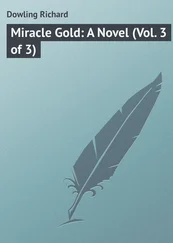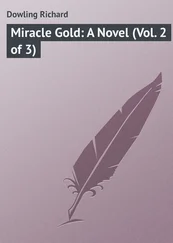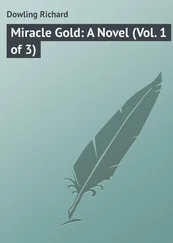Richard Dowling - An Isle of Surrey - A Novel
Здесь есть возможность читать онлайн «Richard Dowling - An Isle of Surrey - A Novel» — ознакомительный отрывок электронной книги совершенно бесплатно, а после прочтения отрывка купить полную версию. В некоторых случаях можно слушать аудио, скачать через торрент в формате fb2 и присутствует краткое содержание. Жанр: foreign_prose, на английском языке. Описание произведения, (предисловие) а так же отзывы посетителей доступны на портале библиотеки ЛибКат.
- Название:An Isle of Surrey: A Novel
- Автор:
- Жанр:
- Год:неизвестен
- ISBN:нет данных
- Рейтинг книги:3 / 5. Голосов: 1
-
Избранное:Добавить в избранное
- Отзывы:
-
Ваша оценка:
- 60
- 1
- 2
- 3
- 4
- 5
An Isle of Surrey: A Novel: краткое содержание, описание и аннотация
Предлагаем к чтению аннотацию, описание, краткое содержание или предисловие (зависит от того, что написал сам автор книги «An Isle of Surrey: A Novel»). Если вы не нашли необходимую информацию о книге — напишите в комментариях, мы постараемся отыскать её.
An Isle of Surrey: A Novel — читать онлайн ознакомительный отрывок
Ниже представлен текст книги, разбитый по страницам. Система сохранения места последней прочитанной страницы, позволяет с удобством читать онлайн бесплатно книгу «An Isle of Surrey: A Novel», без необходимости каждый раз заново искать на чём Вы остановились. Поставьте закладку, и сможете в любой момент перейти на страницу, на которой закончили чтение.
Интервал:
Закладка:
"No; but the shame which has come upon you through my blood can be washed out in his, and by-, it shall! and here I swear it afresh."
With a sudden movement forward he flung himself on his knees and threw his open right hand up, calling Heaven to witness his oath.
Bramwell paused in his walk. The two men remained motionless for a moment. Suddenly Bramwell started. There was a loud knocking at the door.
CHAPTER VIII.
FATHER AND SON
Ray rose to his feet and bent forward.
"I did not know you expected any visitor," said he in a tone of strong irritation.
"I do not expect any visitor. I never have any visitor but you," said Bramwell, looking round him in perplexity, as though in search of an explanation of the sound. He was beginning to think that his ears must have deceived him, and that the knock had not been at the door. "Did you," he asked, "draw back the stage when you got here?"
"Yes, but I did not fasten it. Any one on the tow-path might have pulled it across again. I hope no one has been eavesdropping."
"Eavesdropping! No. Who would care to eavesdrop at my door?"
"HE!"
"Philip, you are mad? If you trifle with your reason in this way you will hurt it permanently. I do not believe there was any knock at all. It may have been a stone thrown by some boy from the tow-path."
"Well, open the door and see. There can be no harm in doing that."
Ray stretched out his hand to recover the revolver which he had placed on the table. Bramwell snatched it up, saying:
"What folly, Philip! I will have no nonsense with such tools as this. We are in England-not the West of America." He dropped the revolver into the pocket of his jacket.
The minds of both men had been so concentrated on the idea of John Ainsworth during this interview that neither would have felt much surprise to find him on the threshold. Bramwell had repudiated Ray's suggestion that Ainsworth was there, but in his heart he was not sure of his own assertion. Nothing on earth could be more monstrously improbable than that Ainsworth would come and knock at that door; but then neither of the men in the room was in full possession of his reasoning powers. While Bramwell had lived on Boland's Ait no caller but Philip Ray had ever knocked at that door before, and now-now there came a knock while Philip Ray was sitting in the room, and as they had heard of Ainsworth's presence in England, and at the very moment Philip Ray was swearing to take that reprobate's life. Reason said it was absurd to suppose Ainsworth could be there. Imagination said he might; and if he were found there while Philip was in this fury, what direful things might not happen? Now that Bramwell had the revolver in his possession he felt more assured.
He moved to the door, opened it, and looked out.
No figure rose between him and the deep dusk of night. The light from the lamp on the table passed out through the doorway, and shone upon the wall of the old engine-house opposite.
"There is no one. It must have been a stone," said Bramwell, relieved, and drawing back.
"A stone cannot hit twice. There were two knocks. I heard two quite distinctly. Go out and look around. Or stay, I'll go. Give me back my revolver."
"No, no. Stay where you are. I will see."
He was in the act of stepping forth, when, looking down, he suddenly perceived the figure of a little child in the doorway. With a cry, "What is this?" he sprang back into the middle of the room.
Ray shouted, "Is the villain there? I told you it was Ainsworth!"
Ray was about to pass Bramwell at a bound, when the latter seized him and held him back, and, pointing to the child in the doorway, whispered, "Look!"
Ray peered into the gloom, and then came forward a pace warily, as though suspecting danger. "A child!" he cried in a whisper. "A little child! How did he come here? Do you know anything of him?"
"No." Bramwell shuddered and drew back until he could reach the support of the table, on which he rested his hand.
Ray advanced still further, and, bending his tall thin figure, asked in a muffled voice, "Who are you, my little man? and what have you got in your hand?" The child held something white in a hand which he extended to Ray.
The child did not answer, but crossed the threshold into the full light of the lamp, still offering the white object, which now could be seen to be a letter.
"What is your name, my little man?" repeated Ray, with a look of something like awe on his face.
"Don't!" whispered Bramwell, backing until he reached his chair. "Don't! Can't you see his name?"
"No. I am not able to make out what is on the paper at the distance. Give me the paper, my little lad."
Bramwell knew what the name of the child was, and Ray had a tumultuous and superstitious feeling that the coming of this child across the water in the night to the lonely islet and this solitary man had some portentous significance.
Ray took the letter from the child, and read the superscription with dull sight. Then he said, turning to Bramwell, "This does not explain how you know his name. There is nothing on this but,
'Francis Bramwell, Esq. Boland's Ait, South London Canal.'What is your name? Tell me your name, my little man."
"Frank," said the child in a frightened voice.
"Yes. What else?"
"Mellor."
"What!" shouted Ray, catching up the boy from the floor and holding the little face close to the lamp.
"Did not you see his name on his face? Look! Is it not her face? Philip, I am suffocating!"
Ray gazed at the child long and eagerly. Bramwell, swaying to and fro by his chair, kept his eyes on the rosy face of the boy. The boy blinked at the light, and looked from one man to the other with wide-open, unconcerned eyes. At length Ray put the little fellow on the floor. The boy went to the table and began looking at the papers spread upon it. From his self possessed, unabashed manner, it was plain he was well accustomed to strangers.
"Who brought you here?" asked Ray again. The other man seemed bereft of voice and motion, save the long swaying motion, which he mechanically tried to steady by laying hold of the arm of the chair.
"A man," answered the child, running his chubby young fingers through some papers.
"Where did you come from?"
"Mother," answered the child.
"Who is mother?"
The boy looked round in smiling surprise.
"Mother is mother," and he laughed at the notion of grown-up people not knowing so simple a thing as that his mother was mother. He was thoroughly at his ease-quite a person of the world.
"You had better open the letter," said Ray, holding it out to Bramwell. "I did not recognise the writing. It is not like what I remember, and it is in pencil."
Bramwell took the letter. His face worked convulsively as he examined it. "I should not recognise the writing either, and yet it could be no other than hers, once you think of her and look at it." He turned the unopened envelope round and round in his hand. "What is the good of opening this, Philip? It will make no difference in me. I shall never look at her of my own free-will again."
"How can you judge the good of opening it unless you know what it contains? You cannot send it back by this messenger. My little lad," he said, turning to the child, who was still moving his dimpled fingers through the confused mass of papers on the table, "where is the man that brought you here?"
"Gone away," answered the child, without suspending his occupation.
"He left you at the door and knocked and went away?"
The boy nodded.
"He brought you across the water and set you down and knocked, and went back across the water?"
"Went back across the water," repeated the boy.
"What did he do then?"
Читать дальшеИнтервал:
Закладка:
Похожие книги на «An Isle of Surrey: A Novel»
Представляем Вашему вниманию похожие книги на «An Isle of Surrey: A Novel» списком для выбора. Мы отобрали схожую по названию и смыслу литературу в надежде предоставить читателям больше вариантов отыскать новые, интересные, ещё непрочитанные произведения.
Обсуждение, отзывы о книге «An Isle of Surrey: A Novel» и просто собственные мнения читателей. Оставьте ваши комментарии, напишите, что Вы думаете о произведении, его смысле или главных героях. Укажите что конкретно понравилось, а что нет, и почему Вы так считаете.












